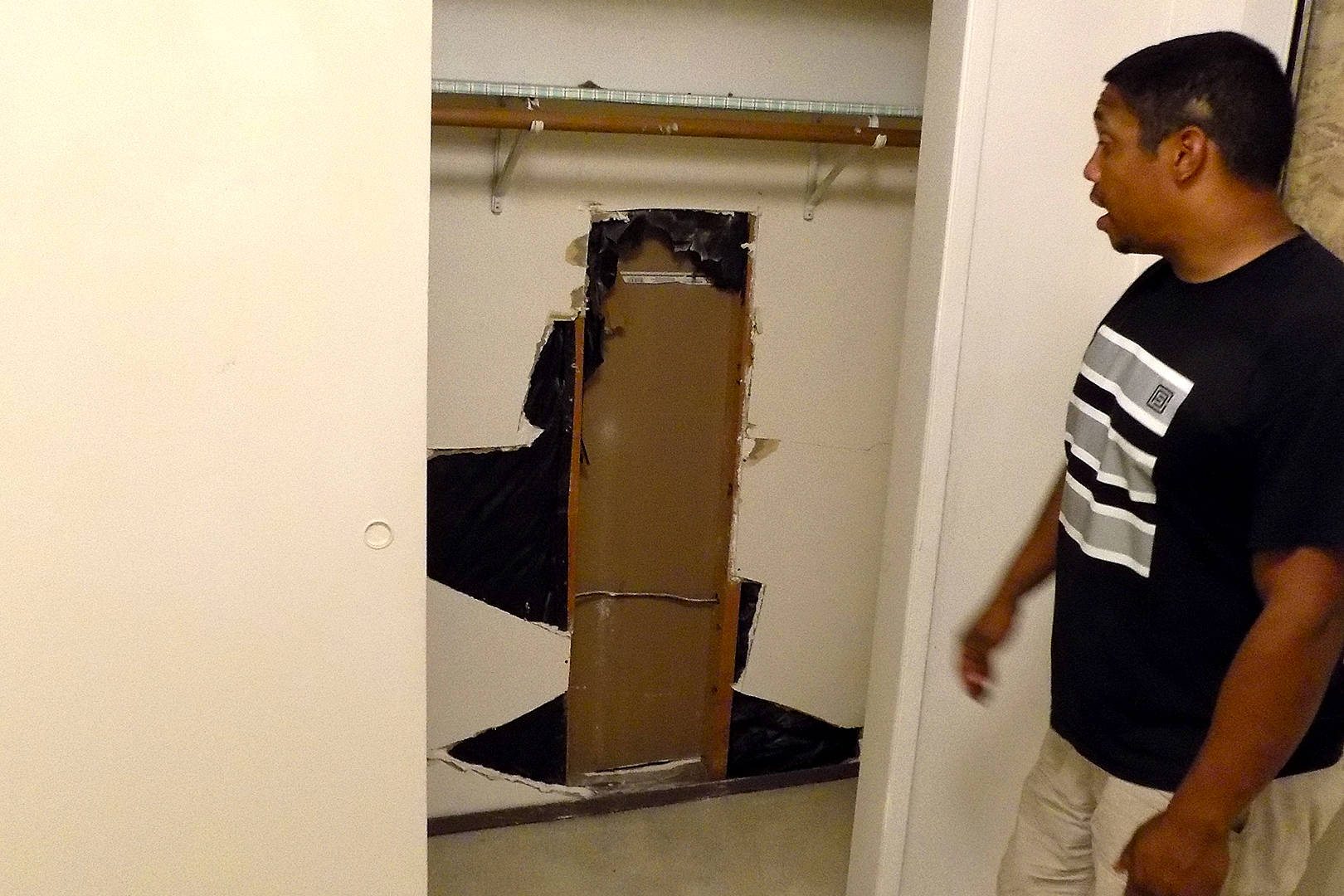The house’s windows are boarded up with plywood, a line of battered doorknobs sits on a window sill, and a second-hand couch is the only furniture adorning the interior.
Anthony Banks can’t wait to move in. “This is a good place to save money and figure out what your next step is going to be,” he says.
Banks is a member of an organization called Weld that assists people released from prison with housing, placing them in buildings soon to be demolished. Weld partners with the owners of vacant buildings to provide the housing. In return for letting the program use their space, property owners don’t have to worry about squatters moving in.
Weld grew out of a collaboration between Amy and Brady King, who own and operate local construction company Square Peg Development, and one of their managers, who’d spent time in the prison system himself and encouraged others recently released from incarceration to apply for jobs at the company helping to demolish old buildings and construct new ones in their place. Square Peg soon realized that while his workers were pulling a paycheck, they still struggled to find housing in the city, often sleeping in cars at the worksite. Meanwhile, the Kings were well aware that their clients were struggling to keep squatters out of the buildings they were about to demolish. So they began to petition their clients to let their workers use the homes temporarily. As the company hired more employees with criminal or dependency backgrounds, they decided to formalize the company’s support role by officially founding a nonprofit.
Almost a year later, Square Peg now employs about 50 Weld “members” with criminal or drug-recovery backgrounds. The nonprofit, operating out of Square Peg’s foyer, fills a human-resources support role for those workers, providing job referrals to other employers and connecting members with financial-planning, vocational-training, and family-reintegration services at partnering organizations. Perhaps most important is the support network Weld provides for people transitioning from prison life.
Banks, released from prison last October, became a member of Weld and started working for Square Peg in November, then moved into his first Weld home in February. Since then he’s become a house manager, and is now interviewing new applicants for a home the program recently acquired.
On our tour, he showed me places where Weld members had made repairs and alterations. A hole chiseled through a closet wall by squatters has been patched with fresh drywall; a room where graffiti once covered the walls has a new layer of paint. The repairs are a way for residents to hone their construction skills.
Banks makes living in a Weld house sound daunting: weekly drug urinalyses, curfews for the first month, and drug testing on the recommendation of housemates. As a house manager, he’ll be responsible for making sure residents obey curfew, continue to look for or show up to a job, and attend any substance-abuse support groups they’re enrolled in.
Yet he says those practices have made a difference. Before moving into a Weld home, Banks lived in two houses labeled clean and sober that were anything but. He attributes the absence of drugs in Weld houses to the camaraderie of living in a mutually supporting network where residents interview prospective housemates. In potential roommates, he says he looks for someone “who wants to change, who wants to help other people.”
The program operates three houses, each providing lodging for up to four members, and maintains a waiting list of individuals who hope to find a short-term home with the nonprofit. All those currently living in the homes are employed by Square Peg Development. Social worker Stephen Jones, Weld’s director of programs, says most people released from prison will return within five years “because they don’t have access to employment, they don’t have access to housing, and they don’t have a community of support.”
In a move certain to attract the attention of renters’-rights groups, members living in Weld-managed homes waive their Washington state tenants’ rights. They can be evicted without notice once Seattle issues new building permits. Members who live in houses also pay $350 a month in membership dues that go toward the maintenance of the house and the upkeep of the program. “We’re very intentional in our language about not creating tenants,” Jones says. “Tenants have rights. We understand those, and those are valuable, but because of our model … we need to be able to as seamlessly and as easily as possible make that transition from one house to the next over a 20-day period.”
As word about Weld gets out, Banks hopes property owners will offer their vacant homes earlier, allowing for longer times between moves and less work to clean up after squatters. “We come into this knowing it will be short-term when we would have to move,” Banks says. “It’s transitional living, it’s not permanent living.”
At least one City Council member also sees value in what Weld is doing. Lisa Herbold’s office is drafting vacant-housing legislation requiring the city to notify property owners of Weld houses when they apply for demolition permits. She says she’d like to charge property owners of vacant properties a fee which could be used by the city to monitor vacant properties for squatters—unless they agree to work with groups like Weld.
Herbold considers Weld residents “caretakers,” and is hesitant to see renters’ protections applied to them. And, along with sponsoring just-passed legislation that bars landlords from asking about criminal backgrounds, she’s eager to see homelessness addressed among those with criminal backgrounds.
“The reality is that one in three Seattleites have some sort of criminal background … and 55 percent of the folks who are unsheltered report their criminal background as being a barrier to accessing housing,” Herbold says. “Unless we address that barrier and work to remove it, we’re all responsible for homelessness.”
news@seattleweekly.com
This story has been updated.




